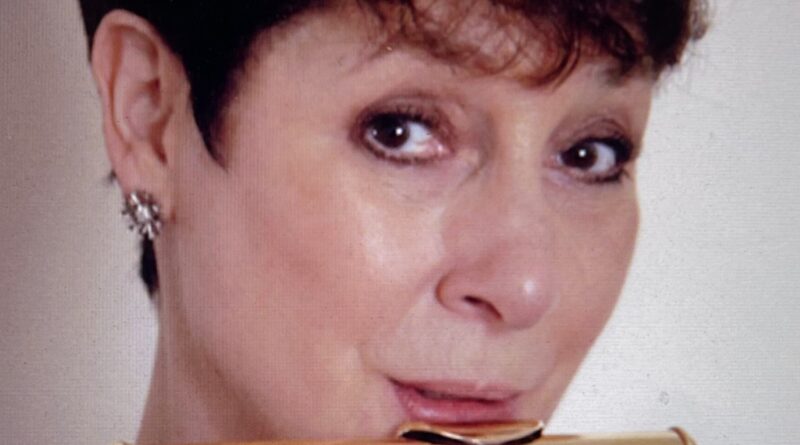Sheryl Cohen Artist Interview
Sheryl Cohen has performed throughout the United States, in Europe, South America, and Asia. A frequent soloist and presenter at National Flute Association conventions and flute festivals across the country and abroad, she has also performed in venues such as Carnegie Weill Recital Hall, in Atlanta with Thamyris Contemporary Ensemble in Hans Werner Henze’s El Cimarron, and at SongFest Art Song Festival in California. Much in demand as a pedagogue, Sheryl Cohen’s book Bel Canto Flute: The Rampal School, won the National Flute Association’s Newly Published Music Competition and is hailed as “one of the most rigorously organized, well-thought-out and creatively written pedagogical books of the last half-century.”
Can you give us 5 career highlights?
1. Watching my flute students follow their dreams to become brilliant performers, teachers, public school educators, and music therapists.
2. Hearing and watching Rampal live for the first time, two months into my first job as principal flutist with the Toledo Orchestra and then studying with him.
3. Performing on a concert tour throughout Asia
4. Invitation to perform in Peru at the 5th International festival in 1990 that led to invitations to perform and give flute courses in Argentina, Ecuador, Brazil, Sweden, Costa Rica, and Colombia, up to the present day.
5. Performing in Hans Werner Henze’s El Cimarron with Atlanta’s Thamyris Contemporary Ensemble
How about three pivotal moments essential to creating the artist you've become?
1. Hearing Albert Tipton perform for the first time as a 13-year-old child, inspired me to play the flute. Then studying with him in Aspen Music Festival and School and eventually earned a DM under him at Florida State University.
2. My first lesson with Jean-Pierre Rampal in Toledo and ensuing study with him in France.
3. My first lesson with Alain Marion.
What do you like best about performing?
Three things stand out in my mind:
1. I love planning recital programs and growing through what the music can teach me.
2. Hearing Albert Tipton in concert changed the direction of my life. When I perform, I imagine that there might be one person in the audience whose life I might impact in some way.
3. I love performing in different countries, where I can share my love of music and ideas with like-minded people from around the world. We are all one.
What are your goals personally? Professionally?
My personal and professional goals are intertwined. It’s difficult to separate me, the person, from me, the musician. I continue to be as passionate about life and music as I was when I was young.
My goal has always been to keep growing as a person and artist.
What inspires you the most in life?
I am inspired by young people who are taking the lead in the war against climate change and other pressing issues facing the world today.
What has been your professional greatest challenge?
Attaining my artistic vision… While some people focus on the flute, technique, or various affectations, my lifelong goal has been to seek ways to be faithful to what composers might have envisioned.
What has been your personal greatest challenge?
GRIEF. With each loss of beloved parents, teachers, friends, and finally my sister, I felt that I no longer knew who I was. During my search to find new ways to live and make music, at times I felt emotionally paralyzed, unable even to breathe. I didn’t know how to express my feelings through music. Over time, my connection to music has evolved and deepened in ways impossible to put into words.
Who were your music mentors? and what did you learn from them?
As I look back upon my 60+ year career, I have my mentors to thank for inspiring and preparing me to manifest a musical life.
Albert Tipton was my first teacher at the Aspen Music School at age 14. As a senior in high school, I asked him where I should attend college and he recommended the University of Michigan, where I began my studies with Nelson Hauenstein. After completing my MM Degree there, I became principal flutist with the Toledo Orchestra, where Jean-Pierre Rampal was the second guest soloist of my first season. He invited me to France to study with him in Nice, where I met Alain Marion, and later studied with him.
In addition to being impeccable artists, each mentor demonstrated aspects of humanity at its best. They were demanding, but taught with kindness, humor, and care for students. Throughout my career, I followed their examples to prepare for every performance opportunity that came my way.
Can you give us five quirky, secret, fun (don't think too much about this) hobbies or passions?
My puppy and bird family, painting, growing house plants, reading, writing…actually, I like everything I do except laundry and housework.
What three things would you offer as advice for a young flutist?
LISTEN: I devote most of my time teaching students how to hear what they are actually playing rather than what they think they are playing.
LISTEN: Practice identifying problems and seek solutions. Whatever problems you might have with tone or technique, don’t look for a new headjoint or a new flute. First, look inside for the root of your problems. Practice fundamental techniques that apply to all music.
LISTEN: Listen to recordings of great artists, not just flutists. This will open your eyes and ears to great music and keep you from getting hooked on momentary fads in the flute world.
Be faithful to what the composer has written.
